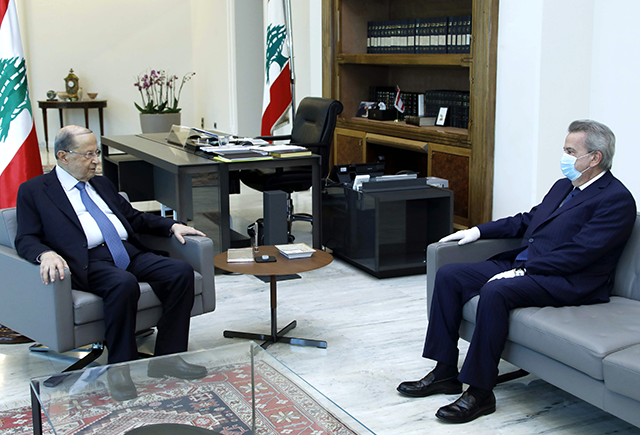You are here
Lebanon to probe 'suspicious' capital flight
By AFP - Dec 26,2019 - Last updated at Dec 26,2019
BEIRUT — Cash-strapped Lebanon's central bank governor Thursday said he would investigate reports of large transfers of money abroad, which if confirmed, would mark a violation of banking restrictions curtailing such transactions.
"We will do everything premissable by law to investigate all transfers [abroad] that happened in 2019," Riad Salameh said after a meeting with lawmakers in parliament.
"If there are suspicious funds, we will be able to find out," he told reporters.
Salameh said that there has been a lot of talk about "politicians, senior civil servants and bank owners" involved in capital flight, adding however that a probe is necessary to identify those responsible.
Faced with a grinding US dollar liquidity crisis, Lebanon's banks have since September imposed increasingly tight restrictions on dollar withdrawals and transfers abroad in an attempt to conserve dwindling foreign currency reserves.
This has fuelled tensions in the debt-ridden country, where a two-month-old protest movement is demanding the removal of political leaders deemed incompetent and corrupt.
Activists say ordinary depositors are footing the bill for a liquidity crisis worsened by politicians, senior civil servants and bank owners who used their influence to get their hefty savings out of the country.
Many of the country’s top leaders own, or have large shares in, several banks.
After meeting Salameh on Thursday, Hasan Fadlallah, a member of powerful Shiite group Hizbollah’s parliamentary bloc, said they discussed ways of retrieving funds transferred abroad in violation of restrictions.
“We are talking about $11 billion,” Fadlallah said, without specifying who carried out such transfers or when they took place.
If funds are retrieved “we will have liquidity and this will allow regular citizens to access their money”, he added.
As Lebanon’s protest movement enters its third month, demonstrators are increasingly targeting banks for trapping their savings.
A report by the Carnegie think tank in November said that nearly $800 million left Lebanon between October 15 and November 7, when most citizens could not access their funds because banks was closed due to protests.
As a result of informal capital controls, the unofficial value of the Lebanese pound against the dollar has dropped by around 30 per cent.
The Lebanese currency has been pegged to the greenback at around 1,500 for two decades and the currencies are used interchangeably in daily life.
Responding to a question about the future of the exchange rate of the Lebanese pound on the parallel market, Salameh told reporters: “No one knows”.
The comments were uncharacteristic of the central bank governor, who has repeatedly maintained that the pound is stable.
Lebanon’s current economic crisis is its worst since the 1975-1990 civil war.
The faltering economy has also pushed many companies into bankruptcy, while others have laid off staff and slashed salaries.
Related Articles
BEIRUT — Lebanon's central bank on Sunday announced a "conditional" plan that would allow depositors, hit by strangling financial restrictio
BEIRUT — Prime Minister Hassan Diab said on Friday that Lebanese bank deposits have plunged $5.7 billion in the first two months of the year
BEIRUT — Lebanon's central bank on Thursday told commercial banks to lower interest rates on dollar and Lebanese pound deposits in the lates

















